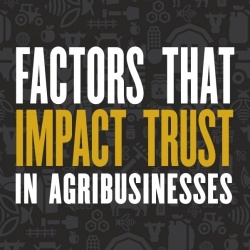Factors That Impact Trust in Agribusiness
 Even though we may not begin our career as a trusted advisor, this is the goal which most of us would like to achieve. Trusted advisor refers to the person or group of people a client seeks advice from when an issue arises or in the case of an urgency. A trusted advisor must have excellent organization and interpersonal skills and needs to earn trust, give advice effectively and build relationships.
Even though we may not begin our career as a trusted advisor, this is the goal which most of us would like to achieve. Trusted advisor refers to the person or group of people a client seeks advice from when an issue arises or in the case of an urgency. A trusted advisor must have excellent organization and interpersonal skills and needs to earn trust, give advice effectively and build relationships.
Four Dimensions of Trust
There are four primary dimensions of trustworthiness; credibility, reliability, intimacy and self-orientation. These dimensions either increase or decrease trustworthiness and a trust advisor must do well on all four dimensions.
- Credibility, as the capability of being believable or honest, is one dimension of trust that is most frequently attained. A trusted advisor may create credibility through frequent positive experiences to make an impression that they are credible.
- Reliability, the second dimension of trust, refers to the capability of consistently performing well to give a client a sense of dependability and trust that the advisor will behave in consistent ways. A trust advisor may create numerous opportunities to confirm his reliability by making promises and delivering on them.
- Intimacy, the third dimension of trust, is the most common cause of distrust. A trusted advisor must work hard to get emotionally close to the client so they can expand the boundaries of acceptable topics and talk about difficult agendas. The goal is to maintain mutual respect and feel comfortable to express emotions.
- Self-orientation, the fourth dimension of trust and another common source of distrust, refers to advisors who appear to focus more on themselves than on trying to be of service to the client. A trusted advisor must put a lot of effort and time to make an impression that they are focused on the client rather than themselves.
The trust equation includes all four dimensions of trust and is given as follows:
Trust = Credibility + Reliability + Intimacy
Self-orientation
We use this equation to understand the factors that affect trust within the existing 166 agricultural cooperatives in Texas. To understand trust issues in cooperatives, this study analyzes the members’ attitudes and behaviors, and evaluates whether there is members’ and managers’ trust or mistrust towards the board of directors. The study aims to address perception of trust internally within members, board of directors and managers in agricultural cooperatives. Furthermore, the study examines whether trust is affected by teamwork, risk perception and satisfaction with communication.
The specific objectives of this study are:
- Analyze four dimensions of trust among members,
- Evaluate teamwork and satisfaction with communication of three groups; managers (non-members), manager-members and members in cooperatives,
- Observe the perception of risk exposure,
- And examine the impact of farmers’ experience and age on their trust in the board of directors.
What are the benefits of trust relationships?
A trusted advisor will be respected and treated the way they wish to be treated. The more the client trusts them, the more the client will reach for their advice and be willing to share information. In addition, trust will lower the level of stress in the interactions and both the client and trusted advisor will feel comfortable.
Check out our upcoming programs and exceed your professional development goals! Position yourself to excel in your career by attending one of our professional development workshops. Each educational program focuses on different business topics and concepts related to the agribusiness industry you serve, including: marketing, sales, finance, talent management and strategy. Not sure which one is right for you? Let’s chat!
Tags:
RELATED POSTS:
Optimizing Sales Management: Knowledge, Coaching and Continuous Improvement
While we used to think that exceptional salespeople possessed an innate gift, recent data suggests the impact of today’s sales managers in nurturing and refining this gift to unlock its fullest potential.
A great moment for value-based sales in agribusiness
Value-based sales can empower companies to craft compelling value propositions, understand the customer’s business model and effectively communicate to stakeholders.
How can big data empower the development of new products?
Data is one of the most powerful resources for a company. It enables accurate decision-making and minimizes risk, ensuring greater revenue and sustainable growth.
